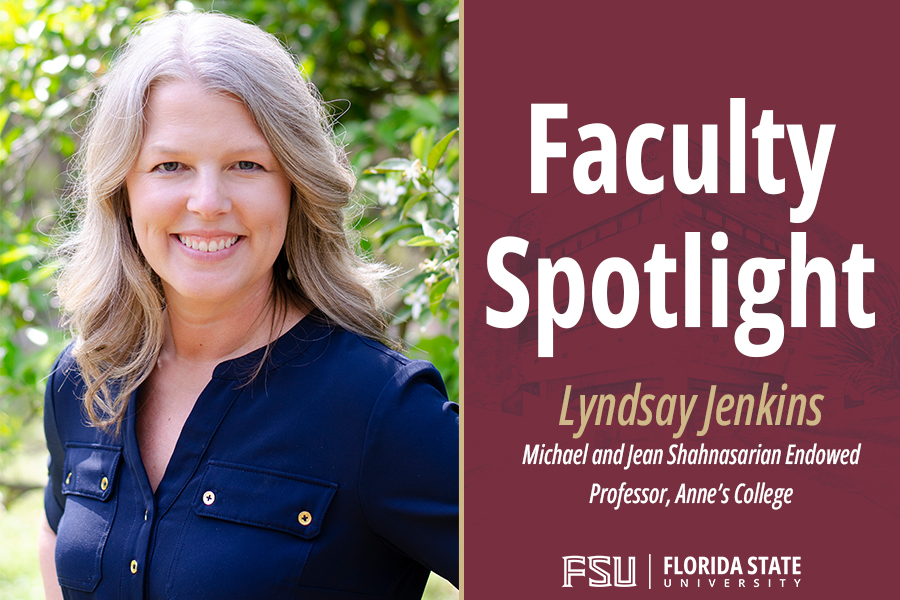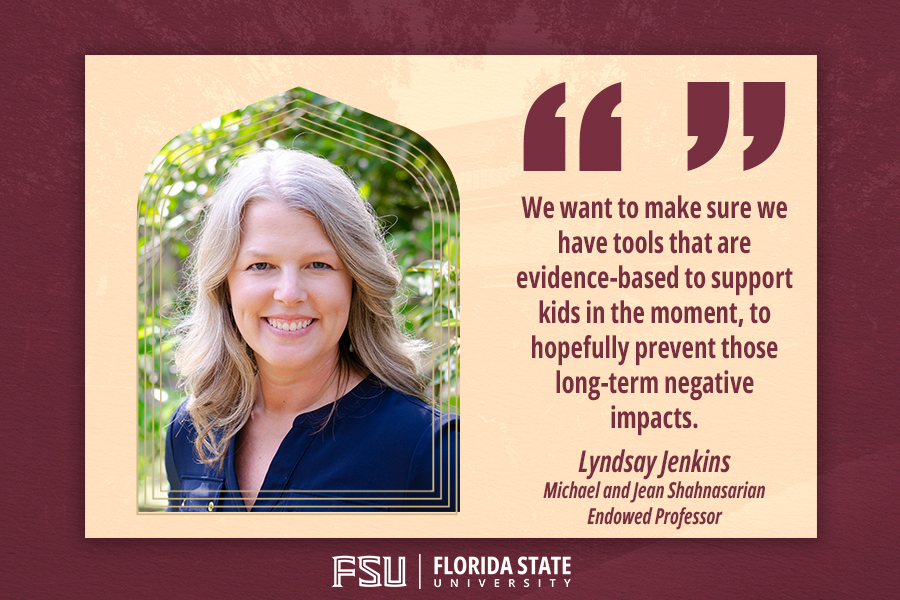
Inside Florida State University’s Department of Education Psychology and Learning Systems, professor Lyndsay Jenkins is filling the void that exists within current bullying interventions.
School districts across the country implement whole school anti-bullying programs, but their lack of research shows an inability to address how adequately victims can be cared for.
Jenkins and her team work daily to fill this gap.
“I’m passionate about trying to come up with research-based interventions that are widely available for use by any mental health professional so that they can support targets of bullying in their daily work, whether they work in a school or community,” Jenkins said. “I think we need to have better programs so people know what to do if they’re working with kids who have been bullied.”
Bullying is prevalent worldwide, more visible now than ever in the era of social media. About 20% of students ages 12-18 have experienced bullying, and about 19% of high school students have been bullied at school.
Jenkins, who was recently elected as an American Psychological Association Fellow, argues that all forms of bullying should not be dismissed.
“I think sometimes people downplay how hurtful bullying can be,” Jenkins said. “They sort of think of it as ‘Oh, that’s just part of growing up,’ or ‘Just ignore it and it’ll go away.’ But research is pretty clear; ignoring it doesn’t tend to do anything. If anything, some kids are telling me it just makes it worse if they try to ignore it.”
In order to change the approach of bullying interventions, Jenkins started IVY in 2019 – an innovative intervention for victims of bullying. Its creative name is emblematic of the way ivy plants grow, prospering in challenging environments – the goal that Jenkins has for her participants in the program.
“IVY is symbolic of how we want kids to thrive despite being in difficult circumstances,” Jenkins added.
The interventions include groups of 5-7 middle school students getting together weekly for eight weeks. A supportive environment is created where Jenkins and her talented team discuss coping skills, how to handle bullying in the future and the opportunity for each victim to talk about their shared experiences.

Originally intended to be in-person interventions when it was founded, IVY transitioned to virtual groups at the start of the pandemic in 2020 – a switch that participants found to be more comfortable.
“I never set out to do a virtual intervention, but it seems to be a selling feature for a lot of kids,” Jenkins added.
IVY has grown in demand, filling up with more participants and even a request to have the program instituted for an entire classroom. Once again, Jenkins and her team repeatedly adapt to what the community tells them, creating research-based interventions fitting a variety of sizes.
Jenkins says the feedback about IVY from participants has been very positive, especially when being able to understand what each is going through.
“There is feedback that we’ve gotten from the kids where they say, ‘Yes, I learned a lot. I feel like I can protect myself better, but it’s really nice to talk to people who have experienced the same thing,’ Jenkins said. “That supportive environment is really an important part of it in addition to the skills that we’re trying to teach them.”
Jenkins’ research is not idea-based. Her work is driven by learning and understanding from bullying victims and the professionals that treat them.
“We’re really trying to take a wide approach when we’re doing this research,” Jenkins said. “We’re not just people sitting in a room coming up with intervention ideas. That’s not the way to do research. We are going to kids. We are asking ‘What do you think is effective, what can work for you?’”
“We’re not just people sitting in a room coming up with intervention ideas. That’s not the way to do research. We are going to kids. We are asking ‘What do you think is effective, what can work for you?’”
– Lyndsay Jenkins, Michael and Jean Shahnasarian Endowed Professor
Jenkins’ passion for developing data-driven bullying research came when she was a school psychologist, with her focus being why children were having learning difficulties in academic settings. Social factors like bullying were behind those challenges, cementing Jenkins’ interest in tackling the issue.
Jenkins’ IVY interventions are expanding toward children with social disabilities such as autism spectrum disorder – requests she is getting more frequently from parents and school officials.
Her current research also involves bystander intervention and what can be done to educate individuals on safely intervening when they see bullying occur. Jenkins is part of an emerging consensus that considers chronic bullying as a form of trauma, creating similar negative impacts as issues like neglect and abuse.
As part of a study, Jenkins and her doctoral students asked young adults to document what they considered to be their most traumatic experiences. Roughly 40% of the respondents determined that bullying was the worst thing to happen to them.
“We see that it’s not just affecting them in middle school or in high school, but potentially this is a kind of a lifelong effect that bullying can have,” Jenkins added. “We want to make sure we have tools that are evidence-based to support kids in the moment, to hopefully prevent those long-term negative impacts.”
Jenkins’ valuable research is setting a new standard in bullying prevention, aiming to become the first of its kind to bring evidence-based programs to the forefront of peer victimization communities.
Her work is an example of how Florida State University continues addressing real-world problems – one data point at a time.



